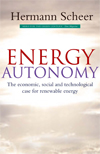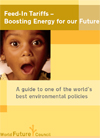Articles
![]() Article by Hermann Scheer, published in the German edition of "Le Monde Diplomatique", February 2010
Article by Hermann Scheer, published in the German edition of "Le Monde Diplomatique", February 2010
The main reason why the public around the world were so shocked by the shameful outcome of the World Climate Conference in Copenhagen was that they were basically unprepared for failure. Everything seemed to be pointing to success: a manifestly pressing problem, upbeat government announcements, urgent appeals from NGOs, worldwide media interest and the participation of numerous heads of state, who hoped to turn the meeting into a "G120" summit.
But the debacle was really not so surprising. It was not by chance that the World Climate Conference used the same script as the 14 previous events staged since 1995: dramatic "now or never" appeals in the run-up to the conference, a process of small-minded and paralysing haggling producing pitiable results and a decision in favour of a follow-up conference during the event, and in the aftermath, mutual finger-pointing. One exception – albeit only in relative terms – was the Kyoto Protocol of 1997, but even in this case it took a further six climate conferences before it came into force in 2005. Even this agreement, however, was unable to prevent a further increase in greenhouse gas emissions.
 Article published in the Ode Magazine (Special Copenhagen Edition), December 12, 2009
Article published in the Ode Magazine (Special Copenhagen Edition), December 12, 2009
To unlock the economic and environmental benefits of renewable energy, dismantle the conventional power industry!
Humanity stands on the threshold of an era of unprecedented opportunities. In the past decades, many innovative new technologies have become available and affordable that can transform our current economies based on polluting fossil fuels into sustainable renewable energy economies. This transformation will provide millions of new jobs. It will halt global warming. It will create a more fair and just world. It will clean our environment and make our lives healthier. However, for all this positive change to happen, we don’t need an international climate treaty. We don’t need a Copenhagen Protocol, just like we didn’t need a Kyoto Protocol. In fact, these international attempts stand in the way of the progress almost all of us need.
![]() Article published in the Climate Action Book 2009 for the UN Climate Change Conference in Copenhagen, December 2009
Article published in the Climate Action Book 2009 for the UN Climate Change Conference in Copenhagen, December 2009
Among the many myths about our energy supplies, one of the most insidious is the high price of renewables. If all energy alternatives are too expensive, the argument runs, then the world should continue on its course of dependence on fossil-based sources. In this article Hermann Scheer debunks this myth and explains why we must keep developing the renwables, describing how each affected industry can make the most of the new opportunities.
We can meet all our electricity needs with renewables
Producing nuclear energy is neither cheap nor safe. It’s time to pay more attention to alternative energies – and to promote them the way nuclear energy once was.
Around the world, there is much fanfare announcing the renaissance of nuclear energy. The International Energy Agency is even calling for the construction of 1,200 new nuclear power plants by 2050.
 Article published in Le monde diplomatique, February 2007
Article published in Le monde diplomatique, February 2007 Une voie réaliste et accessible
Le 1er février sera publié le rapport du Groupement intergouvernemental sur les changements climatiques (GIEC) dont la parution a lieu tous les quatre ans. Une fois de plus sera posé le grave problème du réchauffement de la planète. Cette question majeure plaide pour le développement des énergies naturelles renouvelables, l’éolienne comme les autres, si l’on désire conserver un niveau raisonnable de confort dans les pays développés et élever considérablement celui des pays pauvres.
 Article published in Le Monde diplomatique, June 2006
Article published in Le Monde diplomatique, June 2006 Renewable energies are a realistic and affordable alternative
There is both bad news and good news for world energy supply. The bad news? Oil is running out. The good news? Oil is running out. And not only oil: sooner or later, every type of fossil energy will run out – including fossil uranium ore which is needed to make atomic fuel rods. The reason why oil became the most used form of energy was simple: because it is liquid, making it easier to use, it became the 20th Century's "Black Gold". Yet even John Rockefeller, the first and best-known of the oil magnates, spoke prophetically of "the devil's tears".
 Article published with Jane Taylor, March 2006
Article published with Jane Taylor, March 2006 An answer to James Lovelock
It is a well known experience, that even a high sophisticated scientists views about dangers don’t have adequate answers how to avoid it. So it is a very actual problem, that many protagonists who warn about the running climate catastrophe fail miserably in giving an adequate answer how to fight it. This leads to disastrous socio psychological consequences: people, mainly the young, are left alone with these dangers and don’t believe any more that there could be a solution. This creates no-future mentalities and, as the Californian sociologist Robert N. Bellah wrote in “Habits of the heart”, destroys the social ecology before the destruction of the ecology of nature happens.



